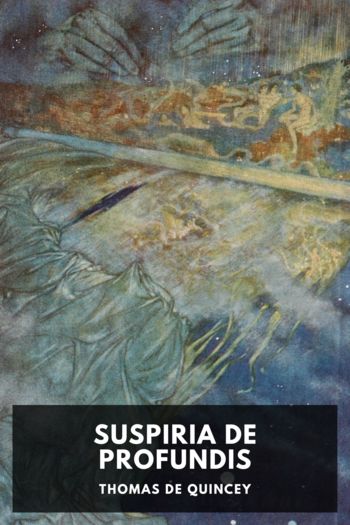Confessions of an English Opium-Eater by Thomas De Quincey (the rosie project txt) 📕

- Author: Thomas De Quincey
Book online «Confessions of an English Opium-Eater by Thomas De Quincey (the rosie project txt) 📕». Author Thomas De Quincey
June, 1819
I have had occasion to remark, at various periods of my life, that the deaths of those whom we love, and indeed the contemplation of death generally, is (cæteris paribus) more affecting in summer than in any other season of the year. And the reasons are these three, I think: first, that the visible heavens in summer appear far higher, more distant, and (if such a solecism may be excused) more infinite; the clouds, by which chiefly the eye expounds the distance of the blue pavilion stretched over our heads, are in summer more voluminous, massed and accumulated in far grander and more towering piles. Secondly, the light and the appearances of the declining and the setting sun are much more fitted to be types and characters of the Infinite. And thirdly (which is the main reason), the exuberant and riotous prodigality of life naturally forces the mind more powerfully upon the antagonist thought of death, and the wintry sterility of the grave. For it may be observed generally, that wherever two thoughts stand related to each other by a law of antagonism, and exist, as it were, by mutual repulsion, they are apt to suggest each other. On these accounts it is that I find it impossible to banish the thought of death when I am walking alone in the endless days of summer; and any particular death, if not more affecting, at least haunts my mind more obstinately and besiegingly in that season. Perhaps this cause, and a slight incident which I omit, might have been the immediate occasions of the following dream, to which, however, a predisposition must always have existed in my mind; but having been once roused it never left me, and split into a thousand fantastic varieties, which often suddenly reunited, and composed again the original dream.
I thought that it was a Sunday morning in May, that it was Easter Sunday, and as yet very early in the morning. I was standing, as it seemed to me, at the door of my own cottage. Right before me lay the very scene which could really be commanded from that situation, but exalted, as was usual, and solemnised by the power of dreams. There were the same mountains, and the same lovely valley at their feet; but the mountains were raised to more than Alpine height, and there was interspace far larger between them of meadows and forest lawns; the hedges were rich with white roses; and no living creature was to be seen, excepting that in the green churchyard there were cattle tranquilly reposing upon the verdant graves, and particularly round about the grave of a child whom I had tenderly loved, just as I had really beheld them, a little before sunrise in the same summer, when that child died. I gazed upon the well-known scene, and I said aloud (as I thought) to myself, “It yet wants much of sunrise, and it is Easter Sunday; and that is the day on which they celebrate the first fruits of resurrection. I will walk abroad; old griefs shall be forgotten today; for the air is cool and still, and the hills are high and stretch away to heaven; and the forest glades are as quiet as the churchyard, and with the dew I can wash the fever from my forehead, and then I shall be unhappy no longer.” And I turned as if to open my garden gate, and immediately I saw upon the left a scene far different, but which yet the power of dreams had reconciled into harmony with the other. The scene was an Oriental one, and there also it was Easter Sunday, and very early in the morning. And at a vast distance were visible, as a stain upon the horizon, the domes and cupolas of a great city—an image or faint abstraction, caught perhaps in childhood from some picture of Jerusalem. And not a bowshot from me, upon a stone and shaded by Judean palms, there sat a woman, and I looked, and it was—Ann! She fixed her eyes upon me earnestly, and I said to her at length: “So, then, I have found you at last.” I waited, but she answered me not a word. Her face was the same as when I saw it last, and yet again how different! Seventeen years ago, when the lamplight fell upon her face, as for the last time I kissed her lips (lips, Ann, that to me were not polluted), her eyes were streaming with tears: the tears





Comments (0)